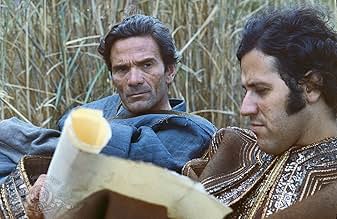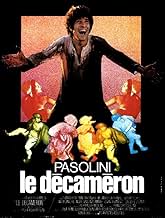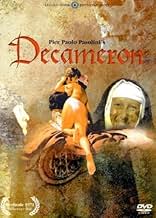Eine Adaption von neun Geschichten aus Boccaccios "Decameron".Eine Adaption von neun Geschichten aus Boccaccios "Decameron".Eine Adaption von neun Geschichten aus Boccaccios "Decameron".
- Regie
- Drehbuch
- Hauptbesetzung
- Auszeichnungen
- 1 Gewinn & 3 Nominierungen insgesamt
Jovan Jovanovic
- Rustico
- (Gelöschte Szenen)
Maria Gabriella Maione
- Una madonna
- (as Gabriella Frankel)
Pier Paolo Pasolini
- Allievo di Giotto
- (as P.P. Pasolini)
Empfohlene Bewertungen
The erotic and more or less picaresque stories of which this movie is composed is based upon a collection of tales written in the 14th century by Bocaccio an Italian writer already called the Voltaire of 14th century. In the Middle Ages there was a tendency later abandoned, of considering erotic adventures under a humoristic point of view. The most common "hero" of those tales was the cuckold husband. I'm not a great fan of Pasolini. However this movie is more or less successful in depicting a series of funny situations related with erotic entanglements. Its merit is more due to the narrative form than to the stories itselves some them less funny than others. But the composition of the successive scenes develops in a series of pictures full of colour and movement portraying the people in the streets in a realistic way, showing popular types such as peasants, merchants, priests, nuns, etc. most of them with no make-up at all which contributes to create a vivid atmosphere that really puts us in the middle of a mediaeval scenery. Not a masterwork but something worth to be seen anyway.
Pasolini freely adapts ten or so episodes from Boccaccio's fourteenth century collection of hundred short stories. He interweaves the tales of happy or tragic lovers, naughty nuns and lusty priests, naive husbands and cheating but quick-witted wives, inept grave robbers, and a young gardener who got more than he had bargained for, with his own meditations on art, life, death and love. Pasolini himself plays a painter Giotto who observes the characters that inspire him to paint a fresco on the church's wall.
"Decameron" is the first part of Pasolini's "Trilogy Of Life", which continues with adaptations of two other celebrated works of world fiction; "The Canterbury Tales" (1972) and the "Arabian Nights" aka "A Thousand and One Nights" (1974). All these books have been known as distinguished and revered works of literature that belong to the immortal classics. There are probably so many big volumes have been written about them that it would take more than a thousand and one days and nights to read them. They talk about love, death, the meaning of life, and religion but first and most of all they entertain. At the time they were told and written down, no one would think of them as the future academic references. That's why they are so alive, earthy, coarse, and bold. I have not seen two other Pasolini's films but 'Decameron' captures the original spirit of Boccaccio's tales truthfully and with love, humanity, and perfect sense of the medieval Italy.
The film has a look of a renaissance painting not only Italian Renaissance (Giotto) but Netherlandish Northern Renaissance - Peter Bruegel and Hieronymus Bosch.
As he often did, Pasolin used in the film the non-professional actors to play the medieval peasants. They had none of the Hollywood glamor or classical features or perfect teeth and smiles but their faces are interesting, original, and real.
Full of rustic comedy and innocence, earthy humor and lust for life "Decameron" is one of the most optimistic, and celebrating life films ever made. Its sexuality is straightforward and honest, moving and not insulting. This film, my first Pasolini made me want to see the rest of the trilogy and the rest of his films.
"Decameron" is the first part of Pasolini's "Trilogy Of Life", which continues with adaptations of two other celebrated works of world fiction; "The Canterbury Tales" (1972) and the "Arabian Nights" aka "A Thousand and One Nights" (1974). All these books have been known as distinguished and revered works of literature that belong to the immortal classics. There are probably so many big volumes have been written about them that it would take more than a thousand and one days and nights to read them. They talk about love, death, the meaning of life, and religion but first and most of all they entertain. At the time they were told and written down, no one would think of them as the future academic references. That's why they are so alive, earthy, coarse, and bold. I have not seen two other Pasolini's films but 'Decameron' captures the original spirit of Boccaccio's tales truthfully and with love, humanity, and perfect sense of the medieval Italy.
The film has a look of a renaissance painting not only Italian Renaissance (Giotto) but Netherlandish Northern Renaissance - Peter Bruegel and Hieronymus Bosch.
As he often did, Pasolin used in the film the non-professional actors to play the medieval peasants. They had none of the Hollywood glamor or classical features or perfect teeth and smiles but their faces are interesting, original, and real.
Full of rustic comedy and innocence, earthy humor and lust for life "Decameron" is one of the most optimistic, and celebrating life films ever made. Its sexuality is straightforward and honest, moving and not insulting. This film, my first Pasolini made me want to see the rest of the trilogy and the rest of his films.
Film lovers know "Andrei Rublov," that Russian film about an icon painter. The beauty of the film comes in part because the filmmaker is on the same quest as his character, and that quest has as its core the discovery of beauty. The interesting thing about movies is that they create and sustain a fantasy world that lives beyond any one movie and into which we assume each movie is born. That world has its own type of beauty, one born of color and glamor and poise.
Paosolini does the same thing as Tarkovsky, but where Tarkovsky dealt with cosmic beauty and recognition, this artist has simpler goals: to engage with flesh, to flow with the simple streams of ignoble daily motion, and to discover beauty in that plain world.
Oh, what a terrific cinematic place to visit! This is a far from that collection of movie metaphors and beauty as we can go. There is no movie acting here. There is no external beauty. There is no recourse to familiar characters or representation. As usual, he draws his source material from matter that is not only before cinema, but before any popular writing.
And he works with that material outside any movie tricks. Well, he still has that Italian tendency to believe that the world is populated by characters and not situations or any sort of fateful flow. Just people who do things. Lots of little things, usually associated with pleasure.
So if you are building a world of cinematic imagination you need to have this as one of your corners. That's silly, every one of us is building a cinematic imagination we cannot avoid it. What I mean to say is that if you are building an imagination, some of which you understand and can use, some of which you actually want and can enjoy without being sucked into reflex...
If you want to just relate to people as people and test how easy it is to find grace in the strangest of faces, then this is your movie voyage for the night.
One rather shocking thing is how the nudity works. In "ordinary" film, we thing nothing of seeing two people humping and moaning, nude pelvises grinding is the most hungry of ways. But we gasp when some genital is shown. Here, the exact reverse is found: no shyness about the obvious existence of genitals, an erection even. A sleeping girl with her hand in her lover's crotch. DIsplayed as if it were in the same cinematic territory as the faces he finds.
But when these characters lay on each other for sex, we have the most prurient of actor's postures. I think this was done simply to avoid an automatic sweep into ordinary film ways. It has that effect anyway.
I don't know anyone that chooses more interesting faces. Distinctly Southern European, odd atypical faces.
And finally, there is the bit of his own story inserted, the artist in the church. Creating scenarios of rich life. In the movie, the most amazing scenes are those that have little or nothing to do with the story. There's a "death" tableau that could be the richest single shot I have ever seen, anywhere.
Ted's Evaluation -- 3 of 3: Worth watching.
Paosolini does the same thing as Tarkovsky, but where Tarkovsky dealt with cosmic beauty and recognition, this artist has simpler goals: to engage with flesh, to flow with the simple streams of ignoble daily motion, and to discover beauty in that plain world.
Oh, what a terrific cinematic place to visit! This is a far from that collection of movie metaphors and beauty as we can go. There is no movie acting here. There is no external beauty. There is no recourse to familiar characters or representation. As usual, he draws his source material from matter that is not only before cinema, but before any popular writing.
And he works with that material outside any movie tricks. Well, he still has that Italian tendency to believe that the world is populated by characters and not situations or any sort of fateful flow. Just people who do things. Lots of little things, usually associated with pleasure.
So if you are building a world of cinematic imagination you need to have this as one of your corners. That's silly, every one of us is building a cinematic imagination we cannot avoid it. What I mean to say is that if you are building an imagination, some of which you understand and can use, some of which you actually want and can enjoy without being sucked into reflex...
If you want to just relate to people as people and test how easy it is to find grace in the strangest of faces, then this is your movie voyage for the night.
One rather shocking thing is how the nudity works. In "ordinary" film, we thing nothing of seeing two people humping and moaning, nude pelvises grinding is the most hungry of ways. But we gasp when some genital is shown. Here, the exact reverse is found: no shyness about the obvious existence of genitals, an erection even. A sleeping girl with her hand in her lover's crotch. DIsplayed as if it were in the same cinematic territory as the faces he finds.
But when these characters lay on each other for sex, we have the most prurient of actor's postures. I think this was done simply to avoid an automatic sweep into ordinary film ways. It has that effect anyway.
I don't know anyone that chooses more interesting faces. Distinctly Southern European, odd atypical faces.
And finally, there is the bit of his own story inserted, the artist in the church. Creating scenarios of rich life. In the movie, the most amazing scenes are those that have little or nothing to do with the story. There's a "death" tableau that could be the richest single shot I have ever seen, anywhere.
Ted's Evaluation -- 3 of 3: Worth watching.
This film is a portmanteau film based on the famous 14th Century Italian story collection "The Decameron" by Giovanni Boccaccio. The book deals with ten people telling a story each every day for ten days, but Pier Paolo Pasolini (for obvious reasons) chooses merely nine stories for his film. Most of the stories deal with sex or deception (usually both).
Like all portmanteau films, some stories are better than others, but most of the stories in this film are so short that, if you don't enjoy one story, you don't have to wait long for the next one.
The film depicts a world filled with dirt and vulgarity but also full of life. Pasolini used a lot of ordinary people in his films and here we see many of the actors are not conventionally attractive (for example many have bad, or missing, teeth). Pasolini appears in the film as a pupil of the painter Giotto who is assigned to paint a mural on the wall of a church.
I found this film funny, charming and very entertaining. Definitely for adults though, there is quite a lot of sex and nudity on display here.
This was the first film in Pasolini's so-called "Trilogy of Life" and was followed by "The Canterbury Tales" and "The Arabian Nights".
Like all portmanteau films, some stories are better than others, but most of the stories in this film are so short that, if you don't enjoy one story, you don't have to wait long for the next one.
The film depicts a world filled with dirt and vulgarity but also full of life. Pasolini used a lot of ordinary people in his films and here we see many of the actors are not conventionally attractive (for example many have bad, or missing, teeth). Pasolini appears in the film as a pupil of the painter Giotto who is assigned to paint a mural on the wall of a church.
I found this film funny, charming and very entertaining. Definitely for adults though, there is quite a lot of sex and nudity on display here.
This was the first film in Pasolini's so-called "Trilogy of Life" and was followed by "The Canterbury Tales" and "The Arabian Nights".
This is the first of Pasolini's three feature-film adaptations of obscene tales of antiquity, the other two being "The Canterbury Tales" and "The Arabian Nights." It contains ten of Boccaccio's most famous tales
The bawdiest story concerns a merchant who back-doors his partner's wife by promising to tell her his secret of turning a woman to a female horse and back to a woman again...
The tale of the two lovers sleeping together on the terrace is quite nice and very erotic, but the most hilarious one involves a young man who pretends he's a deaf mute in order to get into a convent... Once inside, he discovers that the sisters are very curious about all the excitement the world has made over sex and want to find out if it is worth it...
The stories are quite funny and the acting is adequate especially for non-professionals But the film's charm is in its unrefined energy It spends as much time showing nude men as it does showing nude women, which was quite unusual for its time
The tale of the two lovers sleeping together on the terrace is quite nice and very erotic, but the most hilarious one involves a young man who pretends he's a deaf mute in order to get into a convent... Once inside, he discovers that the sisters are very curious about all the excitement the world has made over sex and want to find out if it is worth it...
The stories are quite funny and the acting is adequate especially for non-professionals But the film's charm is in its unrefined energy It spends as much time showing nude men as it does showing nude women, which was quite unusual for its time
Wusstest du schon
- WissenswertesDecameron (1971) is the first film in Pier Paolo Pasolini's "Trilogy of Life," continuing with Pasolinis tolldreiste Geschichten (1972) and concluding with Erotische Geschichten aus 1001 Nacht (1974). Each film was an adaptation of a different piece of classical literature focusing on ribald and often irreligious themes. The tales contain abundant nudity, sex, slapstick and scatological humor.
- PatzerWhen the Mother Superior seduces the deaf-mute boy, he's sleeping in a tomato garden. Tomatoes are a New World crop that wouldn't be brought to Italy for another two centuries. The same is true of the corn (maize) growing in the convent's little field.
- Zitate
Allievo di Giotto: Why create a work of art when dreaming about it is so much sweeter?
- Alternative VersionenAlthough the cinema version was intact the 1988 UK Warner video was cut by 22 secs by the BBFC to remove shots of naked genitals during the bedroom sex scene with the nun. The cuts were fully restored in the 2001 BFI DVD release.
- VerbindungenEdited into Porn to Be Free (2016)
- SoundtracksFenesta Ca Lucive
Written by Guglielmo Cottrau, Vincenzo Bellini and Giulio Genoino in 1842
Performed by Franco Citti
Sung by Ser Ciappelletto and his Neapolitan hosts in Germany. Also sung by one of the Neapolitans to a monk.
Top-Auswahl
Melde dich zum Bewerten an und greife auf die Watchlist für personalisierte Empfehlungen zu.
- How long is The Decameron?Powered by Alexa
Details
- Erscheinungsdatum
- Herkunftsländer
- Sprachen
- Auch bekannt als
- El decamerón
- Drehorte
- Produktionsfirmen
- Weitere beteiligte Unternehmen bei IMDbPro anzeigen
Box Office
- Weltweiter Bruttoertrag
- 839 $
- Laufzeit
- 1 Std. 51 Min.(111 min)
- Sound-Mix
- Seitenverhältnis
- 1.85 : 1
Zu dieser Seite beitragen
Bearbeitung vorschlagen oder fehlenden Inhalt hinzufügen




























